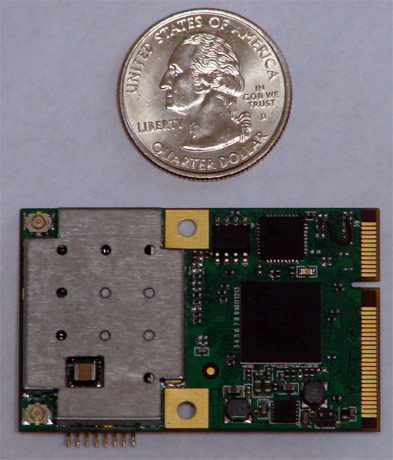 Looking for a convenient and wireless way to view your PC’s content on your crisp HDTV? HD semiconductor manufacturer AMIMON may have the connective solution for you. Today, AMIMON introduced its WHDI modules which can be embedded into notebook and netbook PCs for a “seamless” wireless HD connection to your HDTV. Meaning: You can watch Hulu on an actual big screen, rather than the maximized screen size of your laptop.
Looking for a convenient and wireless way to view your PC’s content on your crisp HDTV? HD semiconductor manufacturer AMIMON may have the connective solution for you. Today, AMIMON introduced its WHDI modules which can be embedded into notebook and netbook PCs for a “seamless” wireless HD connection to your HDTV. Meaning: You can watch Hulu on an actual big screen, rather than the maximized screen size of your laptop.
The WHDI modules let you view the entire content of your notebook screen on your TV. Content such as Internet video, flash media, digital photos, PC games can all be viewed and experienced on your TV with AMIMON’s wireless connection. The company says its WHDI modules will be available with a mini-PCI form-factor of 50mm*30mm and will also be offered with a standard Display-Mini card form-factor of 44.4mm*26mm.
“PCs are increasingly becoming a source of multimedia entertainment like Hulu, YouTube, etc. Consumers will be able to wirelessly connect their PCs and watch all this cool new content on their big screen TV anywhere in the home,” said Noam Geri, vice president of marketing and business development for AMIMON. “WHDI is gaining momentum with TV OEMs and now also PC OEMs set to offer consumers multiple WHDI enabled products in 2010.”
AMIMOn says its WHDI modules are designed for low power consumption (suitable for battery-powered devices) and they integrate WHDI + Wi-Fi semiconductor components that offer notebook OEMs the prospect of a very low cost WHDI wireless HD link to the TV.
Summary of key features:
- Based on AMIMON’s AMN 2120/2220 WHDI chipset, designed for the WHDI standard
- Compact form factor
- Support for full high definition resolutions up to 1080p/60Hz
- Practically no latency – less than 1 millisecond
- Hollywood approved HDCP 2.0 copy protection
- Low power consumption modes for portable devices
- Low cost
- 5GHz unlicensed band with support for Dynamic Frequency Selection (DFS)
Image provided by Engadget.com


